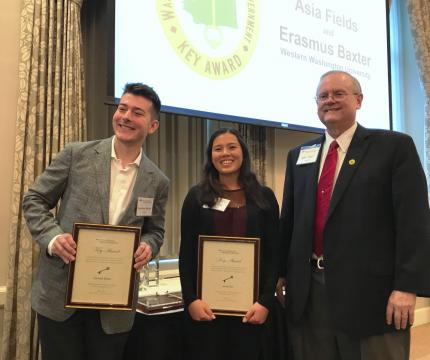Western journalism students win Key Award
Asia Fields and Erasmus Baxter recognized for reporting on the university’s handling of sexual harassment
Story by Mia Stebben
On September 21, 2018, The Washington Coalition for Open Government (WCOG) awarded two Western journalism students Asia Fields and Erasmus Baxter with the Key Award. They were honored and recognized for reporting on the university’s handling of sexual harassment and sexual assault through utilizing Public Records Act.
Both News Editors for the Western Front, Fields and Baxter began their reporting on the topic in the spring of 2017 using public records. Prior to their involvement on the Western Front, the Bellingham Herald had published an article in 2015 about Western’s violations of Title IV as well as the case of former student Connor Griesemer who pleaded guilty to sexual assault, according to Baxter.

In 2016, Alex Halverson, a Front reporter, wrote an article about the mishandling of sexual assault cases on Western’s campus, laying the groundwork for Fields and Baxter. When the Griesemer was readmitted in the spring of 2017, Fields and Baxter wrote an article addressing the issue. They received a flood of reactions from students, faculty and alumni reaching out to the university.
The responses indicated a much larger issue and demonstrated that people wanted to see reporting being done, said Fields. This continued through student activism, student-organized email campaigns, organized events and talking to administrators.
“That was our first story and the launching point even though it wasn’t a story looking at the entire system. It was the first story in a while where a student journalist had really drove into how the university handles these kinds of cases,” Fields said.
Both journalists continued their work on The Western Front and AS Review, a publication for the Associated Students. They interviewed survivors, shed light on lack of sexual assault prevention on campus and focused on how Western handles these cases. Their goal is to keep university accountable and try to bring a level of transparency on how they handle sexual cases, Fields said.
Fields and Baxter acknowledged the survivors and individuals affected by the university’s handling of these cases.
“The survivors were brave enough to come forward with their stories and have their names in the paper, which we realize is not a small feat at all,” Fields said.
They also wanted to recognize the support Western faculty and the Student Press Law Center.
“It gave us a chance to share the story and issues with a wider audience,” Baxter said after receiving the award.
But he realizes there is more work that needs to be done.
“This is an ongoing issue,” Baxter said.
Western is still not releasing the names of students that are found responsible for sexual assault. According to Baxter, the Family Educational Rights and Privacy Act (FERPA) states if an individual finds a student responsible a crime of violent or nonviolent sex offense the name can be released, which was an amendment made by Congress.
